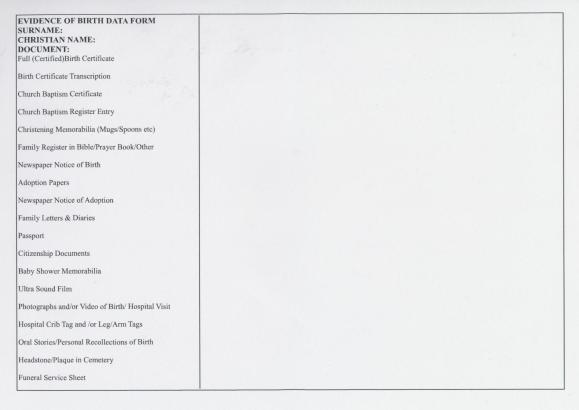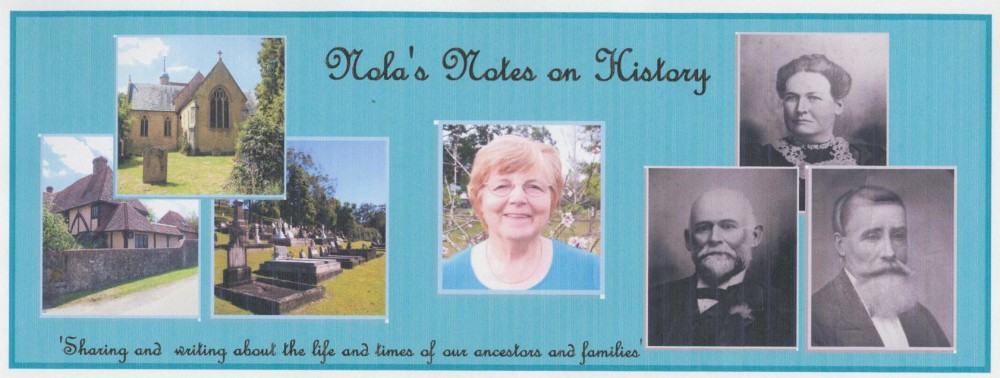In our last class, I invited you to look at your own birth certificate for information concerning your parents. You might think your next step would be to get your parent’s birth certificates using the information stated on your own certificate. This would be a reasonable step towards your own ancestral research plan. However, you might be shocked to know you cannot get another person’s birth certificate unless they were born over a hundred years ago. This is to do with people’s right to privacy and also to stop others using these documents for fraudulent activities such as identity theft.
If your parents are still living, ask them if they have a full copy of their birth certificate and would they be willing for you to make a transcription of the information on it. If they do not have a copy, encourage them to apply for one, even if you actually pay for it. They are the only ones legally able to apply for their own birth certificate. If they are deceased there may be a copy in their private papers. Find out who in the family might have these papers. They may allow you to sight and make a transcription of the document. Even if the person is now deceased you still cannot get a birth certificate unless they were born over 100 years ago.
If your parents, grandparents or another ancestor was born over one hundred years ago in Australia you may find their birth reference number, full name, names of parents and place of birth in the online government indexes.
In Australia, there is no central place for births, marriages, and deaths for the whole of the country. Each state has its own Registrar of Births, Deaths, and Marriage in its capital city.
In recent years each Registrar’s office has built a website where you can search the indexes to their historical documents for births over a hundred years ago. These indexes are free to consult. The large subscription sites use ways to link and use these free sites. They do not have access to any more information than is on the free government websites.
Be aware each of these indexes is a little different. For example- In the Queensland Index for births, which took place over a hundred years ago, it actually gives the date of birth, while on the New South Wales Index it only gives the year of registration. This is usually the year of birth but not always.
Here are the websites for the offices responsible for the registration of births in each state.
https://www.familyhistory.bdm.qld.gov.au/
https://www.justice.tas.gov.au/bdm/home
https://nt.gov.au/law/bdm/search
Please be aware until recent times the parents were responsible for making sure a birth was registered. Sometimes they just didn’t get around to it. In that case, you may not find the birth reference you were looking for. Another reason you may not find it is that you are not using the spelling which was used at the registration, or the child was registered without a Christian name, so it may be registered as an unnamed male or female.
Now, what if, no-one in the family has the certificate or is not willing to share, or you cannot find in in the index, even if it over a hundred years, and should be registered. No, your research does not need to stop. There are ways around this hurdle.
Remember you are looking for information concerning an ‘event’ in the person’s life. There are many records that give information on a person’s birth or leading up to the event. Some of these you may be able to get even if the birth is not one hundred years ago. For example, the birth date may be on a headstone or plaque in a public cemetery or on a funeral service sheet.
Remember one document is not ‘definite proof’ of an event. You can only get a reasonable proof by a range of documents all pointing to the same conclusion.
Be aware your family tree not only includes your ancestors but your descendants too. This means you should be collecting births for them also. However, it is illegal to disseminate private information on living persons without their consent. Just hold this information in your private records file.
Here is a list of records you may use to build a reasonable case for the birth information on an ancestor or descendant.
Full (Certified) Birth Certificate; Birth Certificate Transcription; Church Baptism Certificate; Church Baptism Register Entry; Christening Memorabilia (mugs, spoons, etc); Family Register in Bible; Newspaper Notice of Birth; Adoption Papers; Newspaper Notice of Adoption; Family Letters & Diaries; Passport; Citizenship Documents; Baby Shower Memorabilia; Ultra-Sound Film; Photographs and/or video of Birth/Hospital Visit; Hospital Crib Tag and/or Leg/Arm Bands; Oral Stories/Personal Recollections of Birth from Family & Friends; Headstone or Cemetery Plaque and Funeral Order of Service.
This list is not definitive and you could possibly think of more. You will not be able to get all these records for any one person. They are just a guide.
I have used this list to make myself a Data Sheet to put in my files on an individual person.

[A pdf download of this Data Sheet can be found on this website under the Resources and Examples Tab.]
Many of these records you may find in family papers and memorabilia. If someone shares these with you please record them as the source of the document with their name, date, and address on your copy. Back or front depending on your skills and preference. Just because you now have a copy, please remember this is not your document to scan and put up on the Internet.

This is the Data Sheet filled in for my mother, Margaret Nola Baxter. This is one way I organize and track my progress with my family history research.
It is good family history manners even if you create your own document, such as a transcription, which is quite legal, you should get permission from the original owner to share the information and give them credit for originally sharing with you. Later down the track, they are then likely to share more with you, and you will feel comfortable sharing with them, as you will expect the same courtesy in return.

This is such good info. You are making me want to get back into my family history research. We have some new and good info in the form of handwritten family tree books by the G.O.’s maternal grandmother and details of lots more convicts in his maternal grandfather’s line. But when I do go there, I know nothing else will done. It takes over my life.
No doubt about it for many family historians, it can certainly take over their lives. Trouble is the more you do, the more you want to do. I know many are planning to use this self-isolating time to get organizing, filing, and lots of research done. I hope you too can get some time to indulge.